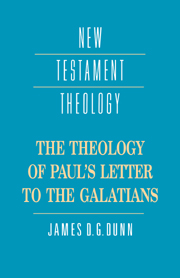Book contents
- Frontmatter
- Contents
- Editor's preface
- Preface
- List of abbreviations
- 1 Introduction
- 2 The make or break issues
- 3 The fundamental agreements
- 4 The heritage of Abraham
- 5 How should the heirs of Abraham live?
- 6 Lesser issues
- 7 The influence of Galatians in Christian thought
- List of further reading
- Index of references
- Index of names
- Index of subjects
5 - How should the heirs of Abraham live?
Published online by Cambridge University Press: 05 June 2012
- Frontmatter
- Contents
- Editor's preface
- Preface
- List of abbreviations
- 1 Introduction
- 2 The make or break issues
- 3 The fundamental agreements
- 4 The heritage of Abraham
- 5 How should the heirs of Abraham live?
- 6 Lesser issues
- 7 The influence of Galatians in Christian thought
- List of further reading
- Index of references
- Index of names
- Index of subjects
Summary
The second principal theme of Paul's argument focuses on the issue, How then should we live? This was a natural and unavoidable question: in order to meet the challenges of everyday life one had to reflect on the practical outworking of one's social situation, religious obligation or philosophical principles. It was a question which absorbed the attention of many of the great minds of the age. At least since the time of Aristotle, ethics, the study of correct human action, had been a prominent topic for philosophers. Many of Paul's Galatian audiences would no doubt have been familiar, for example, with the Stoic conviction that the wise man lives in harmony with nature and with the social critique of wandering Cynic teachers. Listing of vices to be avoided and virtues to be cultivated (as in 5.19–23) was quite a common practice. And household codes as in the later Paulines (Col. 3.18–4.1; Eph. 5.21–6.4) would probably also have been familiar. Equally important were the corollaries for individual conduct of the different social rituals which provided the framework for daily life within an ancient city – particularly some acknowledgement of the civic cult (mark of good citizenship), obligation to one's patron and participation in trade guilds or burial clubs – while some would find particular meaning in the rituals of a mystery cult.
It was one of the features which seems to have proved most attractive about Judaism for many who would otherwise have seen it simply as the ethnic religion of the Jews – their well-defined ethical codes and high moral standards.
- Type
- Chapter
- Information
- The Theology of Paul's Letter to the Galatians , pp. 101 - 120Publisher: Cambridge University PressPrint publication year: 1993

